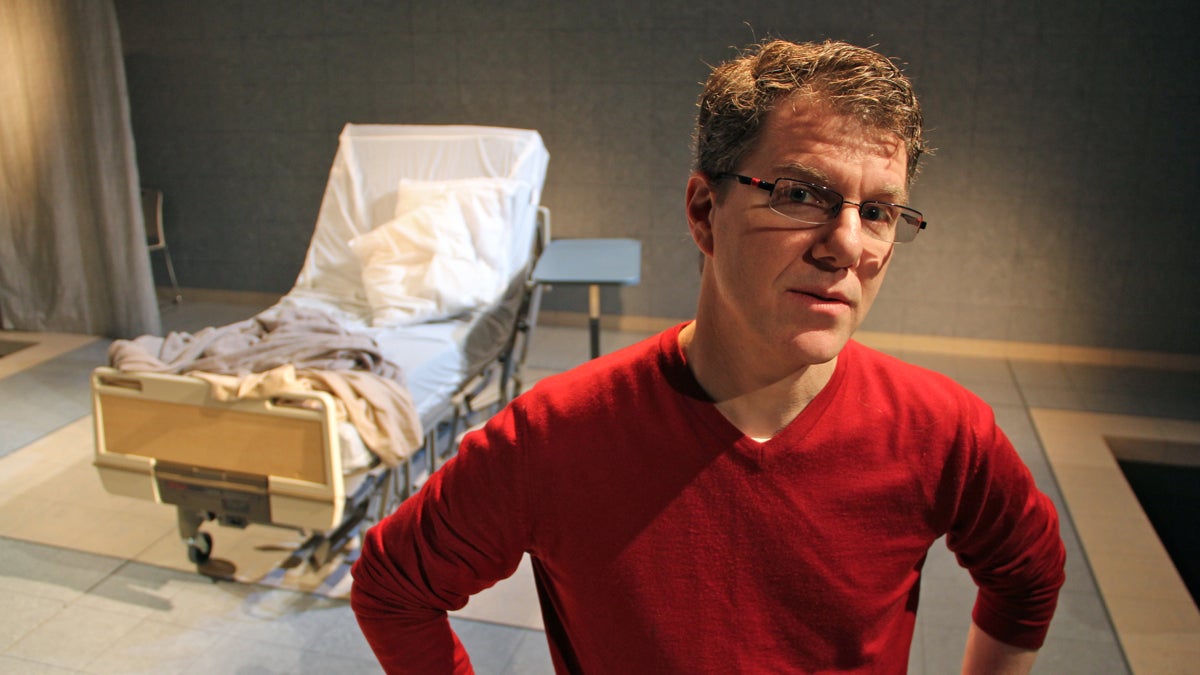Arden Theater’s new play finds the funny in kidney transplants
Listen
Michael Hollinger's play
What happens when one person is asked donate an organ to another person?
“Under the Skin,” now premiering at the Arden Theater in Philadelphia, is a play about a kidney transplant. It touches on medical consequences, ethical issues, and family breakdowns that arise when one person is asked to donate an organ to another person.
Naturally, it’s a comedy.
Most of the action takes place in a hospital room, where an older, bedridden man is trying to convince his estranged daughter to give him a kidney. As she reminds him how lousy a father he has been, he reminds her that he used to sing her to sleep as a baby.
“What song?” asked the daughter, Raina, played by Julianna Zinkel.”Hm?” said Lou, her father, played by Douglas Rees.”You said you sang a song to help me sleep.””Oh! Mack the Knife.””You sang me a lullabye about a serial killer?””Seemed to work.”
It always gets a laugh. A big one.
“It’s better to get one big laugh than three or four little ones,” said playwright Michael Hollinger. “An audience builds up a certain tension that is released in a big laugh. Little laughs don’t release that. Little laughs enervate you a little bit. They keep the play from blowing up. But you want the play to blow up.”
The Raina character keeps a list of pros and cons about her father, to help her decide if he is worthy of her kidney.
He forgets the name of his 4-year-old granddaughter? Demerit.
He flirts with his nurse? Demerit.
The chips are stacked against the father, but the daughter still lingers around the hospital.
“One of the things I like about this world is it magnifies family issues,” said Hollinger. “In most families, people have senses of boundaries. I’ll send a birthday card, but I’ll be damned if I send a present. Or, sure you can visit me this weekend but I’m not going to take off my job. So people say, I’ll go this far, but not that far.”
The laughs do not come fast and furious. Rather than crackle, the comedy lays low a while, waiting for emotional arguments and confessions to play out, then spikes up like a tent pole. Funny situations tend to waft through the script, unannounced.
For example, people who are testing to be kidney donors have to collect their urine for 24 hours. Onstage, the characters carry around big orange, plastic buckets with them at all times, to save their pee.
This is true. People screening to be kidney donors at Lankenau Hospital, in Wynnewood, Pa., are given 2-liter orange, plastic containers to collect every drop of urine for a day.
“You wake up the one morning, and collect all day, all night, and the next morning,” said Marie Manley, an assistant coordinator for kidney transplant screenings. “And when people are conscious they are collecting, they tend to drink more, like it’s a test for volume.”
The playwright consulted with Manley while he was writing “Under the Skin” to get the details right about paperwork, testing procedures, and the time it takes to do them. Manley has seen the play – twice – and says the script gets it right, save in one respect: kidney donations usually do not involve dramatic family breakdowns. Emotionally, they tend to run pretty smoothly.
“Most people who come are more than wiling to give to a loved one,” said Manley. “It’s heartwarming to see. It’s very nice.”
She should know: Manley, herself, is a kidney donor. She did it anonymously, giving her kidney to someone she had never met, at a parish she and her husband had just moved into, without knowing anybody there.
“We got the church bulletin, and there was a blurb in there by a young woman needing a kidney,” said Manley. “I turned to my husband and said, I can do this.”
Manley said she gave her children the right to reject the idea, but she didn’t give a second thought to donating her kidney to a stranger.
Since the donation seven years ago, Manley has met the recipient of her kidney. She lives about two blocks away from her, and they have become pretty good friends. They talk on the phone almost every week, and they don’t talk about kidneys.
“Even when I am with her I don’t think about it. If it was an arm or a leg that you saw it would be a different story, but who sees a kidney?” said Manley. “It’s changed me emotionally and spiritually, the whole experience. There’s a connection, you know?”
That feeling of connection to a larger body of humanity is in the play. ‘Under the Skin’ suggests that our bodies are not ours alone, but flesh can be shared communally with friends, family, and even strangers.
It’s a poetic leap the playwright, Michael Hollinger, is not willing to make himself. He once agreed to donate a kidney to his ailing father in law – a transaction doctors would not allow to happen in the end. Even though he was prepared to give up a kidney, he is not prepared to give it to a stranger.
“I’m open to somebody in my personal life, but the notion of me contacting somebody I don’t know on the other side of the country, or across the city, is outside the realm of what I would consider,” said Hollinger. “But my sense of what is mine and what is others has been stretched while writing this play.”
“Under the Skin” runs until March 15 at the Arden Theater.
WHYY is your source for fact-based, in-depth journalism and information. As a nonprofit organization, we rely on financial support from readers like you. Please give today.




